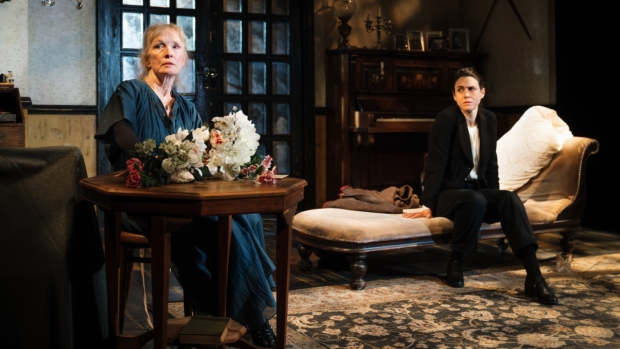
© Alex Brenner
From the Macbeths to Albee's George and Martha, married couples in crisis have always provided rich theatrical fodder. However, few stage marriages are as toxic as that of Strindberg's Alice and Captain Edgar, the principal figures in this 1900 drama, to which the aforementioned Who's Afraid of Virginia Woolf owes a considerable debt. For this Arcola commission, presented jointly with Cambridge Arts, the Royal and Derngate of Northampton, Oxford Playhouse and Theatre Royal Bath, the warring pair are played by real-life couple Lindsay Duncan and Hilton McRae, thereby adding an extra frisson of fascination to Mehmet Ergen's splendid production.
It's a potent pairing. Duncan is all fire and ice: her Alice deals with her (she hopes) terminally ill husband with a mocking eye, grim pragmatism and corrosive wit: she fully convinces as a former actress vacillating between barely able to comprehend that she is eking out her senior years in penury on a remote sea-lashed island with a man she fundamentally loathes, and being defined and embittered by that. Few contemporary actresses can match Duncan's way with a withering put-down, but she also hints, beneath all the bile, at an acute longing for a different kind of life. Her ability to switch authentically from sad (but never sentimental) to imperious, is a thing of exhilarating wonder.
McRae is equally thrilling. Initially, he cuts something of a flamboyant, slightly camp figure, possessed of a mischievous energy as he goads his wife to new levels of exasperation with a playful twinkle in his eye. Gradually though, a darker, troubling side of the Captain emerges, and some of Alice's more damning accusations towards him start to feel uncomfortably accurate. McRae masterfully conveys the contrasting facets of this complex man and makes horribly realistic his trance-like fits and coronary spasms.
Together Duncan and McRae create diabolical, disharmonious magic and, more than any other pairing I've seen in these roles, demonstrate Strindberg's oft-repeated conviction that love and hate are virtually the same thing (the ending is deliciously ambiguous). If the salacious joy of watching these magnificent malcontents tear each other apart never outstays it's welcome, that's because Rebecca Lenkiewicz's sizzling, brutal new adaptation distills the text down to a fleet ninety minutes playing time. In trimming the fat, Lenkiewicz has exposed the guts and lifeblood of a play that has, in some past iterations, felt inaccessible and overly histrionic. Not so here, where the ratio of venomous black comedy to utter despair is a generous one, ensuring that engagement seldom wavers.
Lenkiewicz's darkly funny dialogue sounds credible coming out of the mouths of early twentieth century characters but has a contemporary snap to it, not least because of all the swearing (I think the last time I heard the "c" word used this frequently in a theatre was at The Vagina Monologues). In another departure from tradition, Lenkiewicz makes the third main character, disgraced cousin Kurt with whom Alice has a not entirely platonic relationship and who acts as a catalyst for much of the marital unrest, into female Katrin, played with compelling intensity by Emily Bruni.
Superb as Bruni is, the gender swap doesn't add much to the text as a whole, and the references to her ex-husband as a luxury-loving leech who lived off her as the main breadwinner, don't quite work within the historical setting. It's a small misstep in what is otherwise an expertly judged account of a thorny, elliptical piece. Grace Smart's exquisitely detailed set appears snug and charming at first – all candles, ornaments and scuffed wood – but subtly transforms into a gladiatorial space as David Howe's bilious green-tinged lighting and Dan Balfour's soundscape take chilling hold in Ergen's deft staging.
This is an unusually satisfying and accessible take on a great but far from straightforward play, and a feast of fine acting. By the end of it, one has no idea whether Alice and Edgar would be better off together or apart, but then again neither do they. Nihilism has never felt so cosy, and the state of matrimony seldom so deadly.












